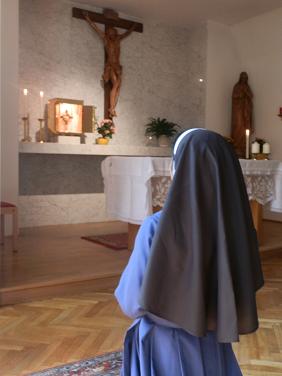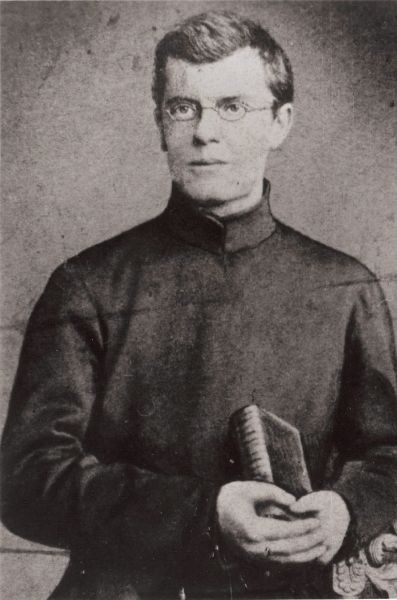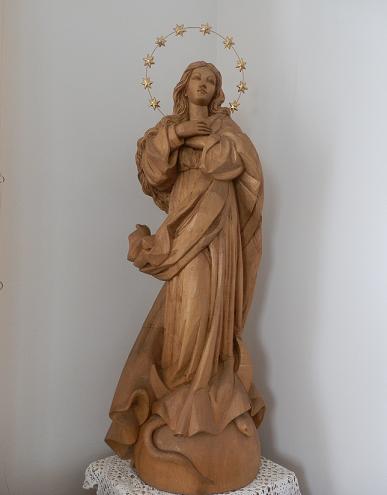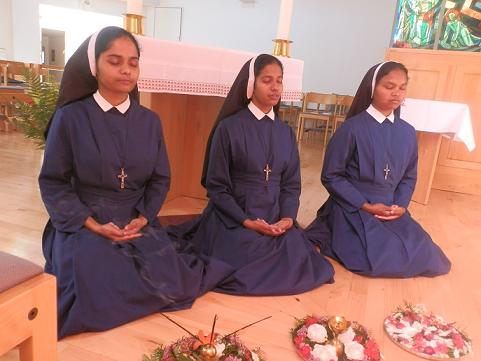Spirituality of SRA

SRA spirituality is a life according to the spirit of the Gospel as interpreted, lived, and conveyed to us by Fr. Bodewig and pioneers. It is fully devoted to the proclamation of the Word of God and the manifestation of his compassionate love.

In the writings of Fr. Bodewig it is evident that even after he left the society of Jesus he continued to draw inspiration and guidance from the spiritual exercises of St. Ignatius as he stated in his memorandum which he presented to the Holy See"...the Society and its members should posses the spirit of St. Ignatius of Loyola, as stated in the booklet 'Spiritual exercises'. For this reason this booklet has an essential part in the formulation of the constitution of our Society from where the members would draw the spirit."
SIGNIFICANT FEATURES OF OUR SPIRITUALITY
i. Contemplation in Action
The Gospel presents to us how Jesus integrates his relationship with the Father and his public ministry. Drawing from Christ's example, Fr Bodewig sought communion and intimacy with Christ throughout his life. Fr Bodewig exhorted his followers to make daily meditation and examination of consciousness saying that through these the members would gain enough energy and strength to work courageously for their mission endeavours. He also communicated, "All the members should renounce the world and to follow Christ in all perfection through a holy and apostolic life."
ii. Centred on the Word of God
Holiness is inconceivable without renewed listening to the word of God. Prayer and contemplation provide the ambience for the reception of the word of God and a source for our proclamation through our apostolic activities that spring from listening to the word of God. It is only when we contemplate the word that can we effectively proclaim. Fr. Bodewig found his nourishment and strength in the word of God and in the Holy Eucharist and yearned to bring this Life-giving nourishment to the millions who were deprived of the life-giving Bread and the Word.

iii. Discernment of the Will of God
Discernment of the will of God was the way of life for Fr Bodewig. In all that he did and said, he was constantly open to the promptings of the Spirit. In confused moments of his life he sought the sign of confirmation of inner urge whether it was the will of God for him. When he did receive confirmation he felt compelled to follow his urge as interior necessity of doing God's Holy Will. For Fr. Bodewig discernment was an ongoing process which led him to persevere in his conviction at the cost of his personal suspension from the faculties of his priesthood and the suppression of his newly-founded group.
As women of prayer and contemplation discernment of the will of God is an inseparable aspect of our life and mission. Our constitutions exhort us to go through a process of discernment prior to making major personal and collective decisions.
iv. Centred on the Eucharist
The mystery of the Cross and the mystery of the Eucharist were the centre of Fr Bodewig's life. From the Eucharistic Lord he drew strength and Inspiration to fulfill his mission. The characteristic of his personal love for Christ was his ardent devotion to the Sacred Heart and to the Holy Eucharist. His book The Benefits of Holy Communion and other writings bear witness to this. He longed to share with the suffering humanity the living and life-giving bread of the soul in the word and in the Holy Eucharist. Throughout his missionary life he lived the mystery of the Eucharist in utmost honesty.
The Eucharist is the centre of our Community and mission, the sacrament of love and unity. The Eucharist draws us into Jesus' act of self-offering and thus we enter into the very dynamism of his self-living. Eucharistic communion includes the reality both of being loved and of loving others in turn. A Eucharist, which does not pass over into the concrete practice of love, is intrinsically fragmented.

v. Marian
Mary played a great role in the life of Fr. Bodewig. It is to her that he takes refuge to make his final decision concerning his vocation to found a missionary society.
He wanted his followers to possess a filial love and the devotion to our Blessed Mother. In his last admonitions to the first group of sisters who began their journey to India Fr. Bodewig says, "Do not be afraid, the Immaculate Virgin will stand by your side.
Mother Xaveria, the co-foundress explained the place of Mary in our life in the following manner. "In our Lady we see the mediatrix of all graces, the first and true disciple of Christ, our perfect model, the luminous ideal of every virtue and sanctity. Each member will foster a deep and child-like love to our Lady in order to obtain through Mary an ever-greater knowledge of our Lord."
The Blessed Virgin Mary, immaculately conceived and Queen of the Apostles, is the patroness of our congregation. Mary with the apostles in the Upper Room models for us a deep faith, joyful hope, strength in trials, and perseverance in prayer. She reflects the teachings of the Gospel and the charisms of consecrated life.
vi. Unshakeable Faith and Deep Conviction
Fr Bodewig experienced the inner force to found a l religious congregation for evangelization. Once he discerned that it was the will of God for him, he was willing to put at stake his name, fame, personal security, reputation, and power, and follow the way of the cross.
As he expressed it, "As to myself I have long ago given up all other endeavours and concerns and devoted myself wholly with all I am and have and can, to the apostolic end."
After the initial foundation of his missionary society, Fr Bodewig met with great crisis. In spite of immense suffering he remained firm and true to his conviction and sought ways and means of safeguarding the vocation of his brothers and sisters. In fulfillment of his vision, no sacrifice was found too hard or difficult. According to the writings of Fr Bodewig, those 'dark years' were marked with an unshakable trust in the providential care of God. His openness to the constant workings of the Spirit in his life was also manifested in his humility, forgiveness, and wisdom and the compassion of Christ was his sole guide. Every sister of the Queen of the Apostles is called to live as convinced religious and zealous missionary, walking in the footsteps of our founder.
vii. For the Greater Glory of God
Fr Bodewig was a Jesuit at heart and was imbued with the spirit of St Ignatius. He was determined to see God alone in all circumstances and to do all things for his greater glory. He was so intensely gripped by the dynamic thirst for the divine that no obstacles, Opposition, or persecutions, could deter him from his focus on the divine call and he continually confronted himself with the question, what more he could do for Christ and his mission.
This implies that the Ignatian concept of Magis invites us not to be satisfied with doing something ordinary bat something more than the usual for the greater glory of God. 1t is a dynamic reality that requires us to do more in our everyday life. In his instructions to the early companions in Mariaveld, Belgium, Fr Bodewig said, "Work always for the greater glory of God and for the salvation of souls". Fr Bodewig wanted not only the individual member but the entire society to direct its efforts towards achieving God's greater glory in fulfillment of the purpose for which the Society was founded.
viii. All Things to All
The vision of Fr Bodewig was meant to reach beyond the boundaries of religions, nations, races, classes, and cultures. Fr. Bodewig urged his group to evangelize, and work for the development of people according to the words of St Paul who became all things to all people.
Becoming all things to all would mean that in our mission of incarnating the Gospel within cultures we identify ourselves with the people. Our constitutions exhort us "We forgo some of the cultural patterns we have been accustomed to, to be part of the new Community." This is an invitation for every member of the congregation to be focused on the other and not on herself, to be a beacon of light to others, to be in solidarity with all who suffer ' and are victims of evil, to move with the compassion of Christ and be ready to go where the need is greater breaking the barriers that divide us from other persons, religions, cultures, and nations. This requires of us an attitudinal change, making ourselves available and approachable to all in humility and love.

